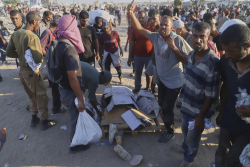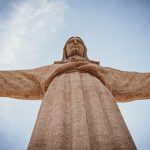As Americans celebrate the Fourth of July, we celebrate our independence with fireworks, flags, and gratitude for freedom. Our young, though rich, heritage causes a patriotic zeal that is the envy of many around the world. But beneath the barbecues and patriotic hymns, the question lingers: What is freedom? And more importantly, what ought it to be?
Modern and post-modern thought have slowly, and often subtly, redefined freedom into something that no longer resembles its classical or Christian origins. Today, freedom is commonly understood as the right to do “whatever I want”—an unfettered autonomy, governed only by individual preference. “Live your truth,” they say. “No one can tell you what to do.” But this conception of freedom, while emotionally appealing, is disastrously incomplete—and ultimately destructive. The Catholic tradition presents a far deeper, nobler, and more fulfilling understanding of what it means to be free.
The Modern Confusion: License, Not Freedom
To the post-modern mind, freedom is reduced to choice itself. Whether the choice is good or evil, noble or depraved, matters little—what matters is that “I chose it.” Freedom becomes synonymous with self-determination without boundaries. But such a view makes morality entirely subjective, responsibility optional, and virtue irrelevant. This “freedom” becomes license, which Pope St. John Paul II once called “the degeneration of true freedom”—freedom without truth.
The result of this worldview is everywhere around us: broken families, confused children, divorce, addiction masked as empowerment, and people drowning in self-made identities that promise liberation but deliver only isolation. Many celebrate their various uses of this freedom to choose with massive parades, but surely we can easily denote that under this thin lining of a false “freedom” is in fact a will to force everyone else into assimilation: you can’t merely appreciate their choices, you must embrace them. When choice itself is treated as the highest good, freedom loses its moral direction—and eventually, its very meaning.
The Catholic View: Freedom for Excellence
By contrast, the Catholic Church teaches that freedom is not the ability to do whatever we want, but the ability to choose the good. True freedom is not freedom from constraints, but freedom for excellence. The Catechism states it this way:
Freedom is the power, rooted in reason and will, to act or not to act, to do this or that, and so to perform deliberate actions on one’s own responsibility. (CCC 1731)
This means that freedom is rooted in our nature as rational beings made in the image of God (cf. CCC 1704). We were created with minds to know the truth and wills to love the good. Our freedom is a gift given not so we can wander aimlessly, but so that we might freely seek God, love Him, and live according to His design.
This is why sin is not a sign of freedom, but its opposite. Sin enslaves us. It warps the will, clouds the intellect, and diminishes our capacity to love. As the Catechism notes, “The more one does what is good, the freer one becomes” (CCC 1733). Ironically, only when we bind our lives to God’s truth do we become truly free.
Free Will: The Power to Choose God
This rightly ordered understanding of freedom also helps us to grasp the deeper reality of free will. Free will is not merely the raw ability to choose between options—it is the interior power of the soul to direct itself toward the good. That is, toward God.
The Catechism teaches that God created man with free will so that, “of his own volition, he might seek God and come freely to perfection” (1730). In this sense, freedom is a necessary condition for love. Forced love is no love at all. God, in His mercy, does not coerce the heart—He woos it. Any good parent can testify that the only way to really have children make the right decisions is to set them free to make those decisions. It sounds like common sense but today it is really quite uncommon, and even loving parents violate this dignity every day.
But with that dignity comes real responsibility. Because we are free, we are morally accountable for our actions. We are capable of good and evil. We reap the blessings of obedience and the consequences of sin. “By free will, he is capable of directing himself toward his true good” (CCC 1704). The drama of human life plays out in this freedom—where every choice is either a step toward God or away from Him.
Freedom and God’s Will: Not a Rivalry
One of the great modern myths is that divine providence and human freedom are incompatible—that if God perfectly knows the future (including our choices) or has a plan for our lives, then our freedom must be an illusion. But Catholic theology holds both truths in perfect tension.
God is outside of time. He sees all things, not merely in advance, but in an eternal “now.” He knows every choice we will make, yet His knowledge does not force our hand. He governs all things with perfect sovereignty, but He allows our free will to play a real and meaningful role in the unfolding of His plan.
In fact, He elevates us through it. The Church teaches that man is not merely a passive recipient of salvation but a cooperator in the divine mission: “By his reason, man recognizes the voice of God . . . and he is called to be a collaborator in his work in the Church and in the world” (CCC 1742).
This means our freedom is not diminished by God’s will—it is fulfilled by it.
Liberty or Liberation?
This brings us back to the modern world’s counterfeit freedom. It promises liberty but delivers bondage. We see this when freedom is used to justify abortion, euthanasia, gender confusion, sexual immorality, or radical autonomy. “My body, my choice” becomes the rallying cry, as if absolute self-sovereignty is the highest good.
But this leads not to fulfillment, but to fragmentation. The person who rejects God’s law does not become more free—he becomes enslaved to sin, to disordered desires, to the tyranny of self.
St. Paul understood this clearly:
For freedom Christ has set us free; stand fast therefore, and do not submit again to a yoke of slavery. (Gal. 5:1)
This is not a political freedom—it is a spiritual liberation. The Gospel does not promise that we will always be free from external constraints. Christians have been imprisoned, persecuted, and martyred throughout history. But even in chains, they were free—because their wills were aligned with God’s. That is the mark of a soul truly liberated.
On this Independence Day, we would do well to ask ourselves: Am I truly free?
Not politically, but spiritually.
Am I free from the domination of sin? From fear? From the compulsion to please the world? Am I free to love God completely and live according to the truth, no matter the cost?
Because the highest freedom is not political liberty or self-rule. It is the freedom of the saints—the freedom to choose what is good, to walk in virtue, to surrender our wills to the Father, and to become fully alive in His love.
This is the freedom Christ died to give us.
And it is the freedom that can never be taken away.
You will know the truth, and the truth will make you free. (Jn. 8:32)















